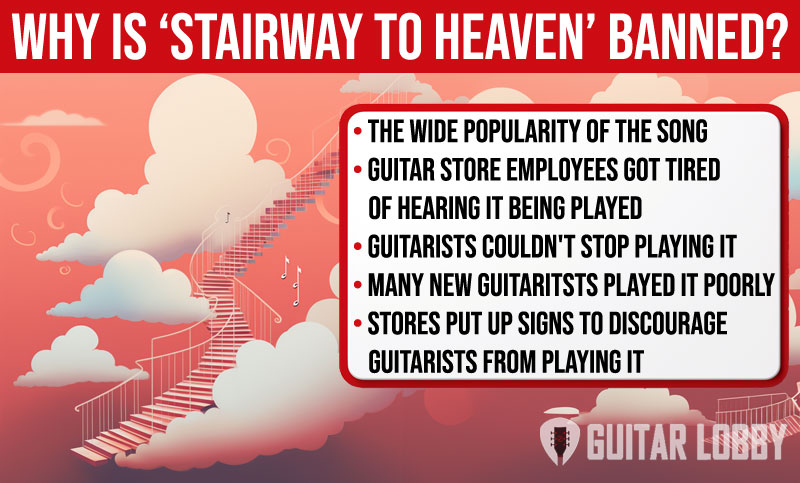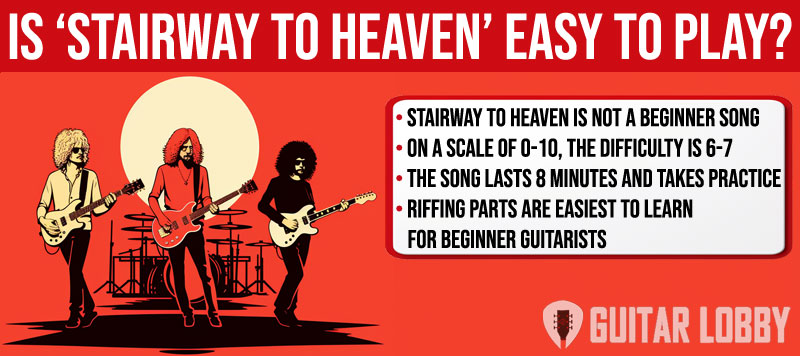You might be wondering why you see signs in music stores forbidding the song Stairway to Heaven by Led Zepplin. Many guitarists are left scratching their heads wondering how such a legendary tune could ever be known as the forbidden riff. So let’s answer the age old question. Why is Stairway to Heaven banned in guitar stores?
Stairway to Heaven is banned in guitar stores because guitar store employees simply get tired of hearing it. The song is so good and addicting that guitarists can’t seem to stop playing it, and because many guitarists are new and play the song poorly, guitar shops put up signs to discourage people from playing it. This is mostly a joke, however, and although you might get some dirty looks, it’s unlikely they actually ask you to leave the store.
Another famous example is “Smoke on the Water” by Deep Purple. What’s more, both of these songs will find their way on the same sign, with music stores stating that these two songs are prohibited on the same sign.

Let’s Dig a Little Deeper Into Why Stairway to Heaven is the Forbidden Riff
So just imagine this, you have an insane amount of beginners of all ages loving this song. And when they learn how to play it, they love it even more. So much that they feel the need to play it whenever they have a guitar at their reach. So whenever they’d get into a guitar store, they take a random acoustic or electric guitar to try out and would just start playing “Stairway to Heaven.” To make things worse, a vast majority of them only know how to play the arpeggiated chords at the intro of the song. And, as you might already have assumed, beginners don’t exactly play it that well. Nonetheless, they still love to show off their guitar skills in front of the world. And “Stairway to Heaven” just happens to be so satisfying when you learn how to play it.

Now, think of yourself as a music store clerk. You come to the music store at the start of your shift. One kid comes in, asks to try out this guitar that caught their eye, takes it, sits down, and starts playing the opening notes of “Stairway to Heaven.” After some random noodling, they start playing it again. After they leave the store, usually without buying anything, another kid comes in and does the same. And this happens over and over again, almost on a daily basis. No matter the greatness of a musical piece, if you hear it that many times, you kind of get sick of it, don’t you? Especially if this great piece is performed by someone who took up guitar a couple of months ago or so. Well, you get the picture. So after hearing the song played that many times, music store workers began putting up signs saying that “Stairway to Heaven” is forbidden. The same could be said about Deep Purple’s “Smoke on the Water.”
However, over the years, this turned into somewhat of an inside joke among guitar players. As time went by, even the absolute beginners became self-aware and accepted it as a light-hearted joke. No one formally forbids you to play this legendary song in a guitar store. Sure, someone will probably throw a joke here and there, someone will roll their eyes and chuckle, but that’s it. So if you’re planning to try out your new guitar in a music store by playing “Stairway to Heaven,” you’re free to do so. Just remember – there’s a high chance that someone will throw in a joke and a laugh in there. But that’s all in good spirits.
Popular Related Article: Most Fun Songs to Play on Guitar (Acoustic and Electric)
So Do People Really Hate “Stairway to Heaven”?
Most of the people don’t really hate on “Stairway to Heaven” or any of the big rock hits. Aside probably from those who wrote them and had to perform them night after night at every single show (in this case, it’s Robert Plant).
Zeppelin’s “Stairway to Heaven” is by no means a bad song. Quite the contrary. Its release marks one of the pivotal moments in the history of not only rock and metal music but modern music in general. After all, Jimmy Page is a musical genius and is still regarded highly among music fans and professional musicians. And what he did on this 1971 tune is just a testament to his greatness.
Like we already mentioned, the song is 8-minutes in length. However, it strongly captivates the listener and it passes so quickly that you kind of feel bummed out when it’s finally over. Many fresh young rock fans put it on repeat and listen to it over and over again. And, to be fair, those veteran rock fans do it too, but they usually won’t admit it since it kind of got the reputation of an overplayed “cliché” rock song. And those who have been playing the guitar for decades love to give it a spin once in a while and remember the good old days when they just started learning their first songs.
The composition, arrangement, and production are “to blame” for the song’s great appeal. The song takes you on a journey, mixing in some melancholic and uplifting feelings in there. Although these parts are so distinct, they flow and fit in so perfectly with one another. Transitions are subtle and smooth, even in the final “heavier” part where it goes into that outro solo and then slows down to the final notes, with Robert Plant adding his tender yet really powerful “and she’s buying a stairway to heaven.” Although it seems like a cliché thing to say, this truly is a masterpiece to be respected.
It’s Actually not THAT bad…
With all this said, you can freely go out there and play “Stairway to Heaven” wherever you want. The whole thing about banning the song, as well as Deep Purple’s “Smoke on the Water,” is mostly an inside joke for guitar players. It was just popularized by the 1992 film “Wayne’s World” and some people took it a bit too seriously.
Is “Stairway to Heaven” easy to learn on the guitar?

We’ve consulted a few expert guitar players on this matter, and while most of them have agreed that “Stairway to Heaven” is not a beginner song, the general consensus seems to be that it is not super difficult either. On a scale of 1 to 10, most folks have given “Stairway to Heaven” a difficulty rating of around 6 to 7. It also depends on which part of the track you are trying to learn; the intro part has a few bits and pieces to pay extra attention to, and so does the solo. The riffing parts seem to be the sections that most guitarists manage to learn the fastest. Overall, folks say that it shouldn’t take more than a week to get a hang of the tune. However, to truly master the intricacies of guitar icon Jimmy Page and deliver “Stairway to Heaven” 100%, it might take years. But worry not, it’s worth the trip!
Popular Related Article: Easy Guitar Solos for Beginners
The Background Behind “Stairway to Heaven”
But before we get into it, let’s first go deeper into this song and find out more details about its background, music, and lyrics. Like we already said, it’s always good to know more about the stories behind the music to get the full context behind it.
Led Zeppelin formed in 1968 when Jimmy Page was looking for the members for The New Yardbirds. Finding a young talented group of musicians that consisted of singer Robert Plant, drummer John Bonham, and bassist and keyboardist John Paul Jones, they soon changed their name to Led Zeppelin. After three very successful records, the time came to release a new record. Little did they know that this album would change the music as we know it.
The year was 1971. This was the turning point for many of the bands at the time. They would either make it or fall into obscurity. The competition was strong – Deep Purple had their “Deep Purple In Rock” already out, Black Sabbath pushed the boundaries of heaviness and blasted everyone’s heads off with “Master of Reality,” and ZZ Top had their debut album out. Quite tough to stay afloat, right?
Well, Led Zeppelin didn’t exactly worry about this. They just did their thing and wrote new music the best way they could. Their fourth album was already recorded and prepared for mixing. Coming out on November 8, 1971, it was immediately met with enormous praise, both from listeners and critics. Officially untitled album, it’s popularly known as the “Led Zeppelin IV.” The other name for the album was “Zoso” (stylized as ZoSo) that came from one of four symbols present on the cover. This particular symbol represented Jimmy Page.
Although all of the songs on this album were received with praise, “Stairway to Heaven” stood out. And it’s rather unusual for a song that’s 8 minutes long to achieve the status of a rock hit. The music for the piece was written by Jimmy Page while the lyrics were finalized by Robert Plant during the recording sessions. The solo was later on recorded by Jimmy Page and it all awaited the mixing process and the release later in 1971.
The song was conceived in a remote cottage in Wales known simply as Bron-Yr-Aur. Always having a tape recorder with him, Page recorded individual parts one by one and then compiled it together. Mr. Plant also added the semi-improvised lyrics over time, with most of the parts staying entirely the same in the final version of the track.
Quite often, the song “Stairway to Heaven” was described as a mash of progressive rock, classic hard rock, and folk music. The piece consists of several different parts, all flowing subtly one into another. The most famous part is its acoustic intro section, accompanied by recorders that were layered in four channels. The section bears very distinctly descending chromatic harmonies. The chords go A minor, A minor/major 9, A minor 7, D/F# major, F major 7, D/G major, and A minor in the open position. All of the chords are arpeggiated and played using the standard fingerpicking technique. The first five chords form a chromatic bass line that goes A-G#-G-F#-F.
After the intro comes a bit more uplifting part played on clean electric guitar. Here we have Jimmy Page alternating between strummed and arpeggiated chords. The song keeps on going with only 6-string acoustic and 12-string electric guitars overdubbed. It’s only at around the 4:20 mark that John Bonham and John Paul Jones kick in on the drums and bass. After the 5:30 mark, the song enters another change that leads it into a now-famous solo that Page performed on his legendary 1959 Fender Telecaster. The solo ends with a faster lick and leads into the final “heavier” part of the song with strummed guitars and a lot of ghost notes. This intense part features A minor, G major, and F major chords, and it finally wraps up with a brief solo and the final line sung by Robert Plant.
As far as the lyrics go, they’ve been interpreted in many different ways. What’s more, Robert Plant himself explained how he interprets the lyrics differently depending on his mood. Although the lyrics are pretty abstract and vague, we could say that the story follows a woman who’s saving money and “buying a stairway to heaven.” The only explanation that Mr. Plant could give was that the woman in question gets everything she wanted in life without giving anything back. Other than that, the deeper meaning remains uncertain. Who knows – maybe it’s for the best this way.
The Song Blew Up
The first time “Stairway to Heaven” was shared with the public on March 5, 1971, during a live show in Belfast, receiving a very lukewarm reaction from the audience. It wasn’t until April 1 that they performed it in front of a live studio audience for a radio broadcast. One thing led to another, and the song gained traction, making it an integral part of the band’s live setlists.
Due to the song’s popularity after the album’s release, Atlantic Records strongly wanted to push it as a single release. However, the band’s legendary – and somewhat controversial – manager Peter Grant insisted that it stays on the album only. And it was a pretty smart move as people began buying albums just so they could hear the song. It was only in 1972 that the label released it as a 7-inch promo single for the US market only.
But despite being available as the album version only, it remained one of the most requested songs on the radio all throughout the 1970s. And being their biggest song, Led Zeppelin played it on every single one of their shows. By the time 1975 came, it turned into a concert-closing piece, with the band delivering an extended version, mostly consisting of Jimmy Page’s prolong solo. Since “Stairway to Heaven” features many changes, Jimmy Page performed it with his double-neck SG, the iconic Gibson EDS-1275. Page alternated between using the 12-string and the 6-string part of the instrument, delivering noticeable contrasts for each section. In the intro part, John Paul Jones implemented a mellotron to replicate the well-known overdubbed recorders from the original studio version. At the same time, he kept to his mellotron all throughout the song, covering the bottom-end areas with this instrument instead of a bass guitar. This is just one of the proofs that John Paul Jones is an unsung and underrated hero of Led Zeppelin.
The Legacy
Met with such critical acclaim from the reviewers and praise from the fans, it didn’t take long for “Stairway to Heaven” to become a genre classic. And, to be fair, the entire 1970s are filled with some of the best-known songs of all time, especially the beginning of this decade. These classic hit songs tend to become pretty popular among other musicians as well as fans who play the guitar or any other instrument. Needless to say, every rock-loving kid in the block wanted to know how to play “Stairway to Heaven” and “Smoke on the Water,” something that’s present even to this day.
The heavy airplay on the radio further pushed the song and turned it into a worldwide hit. Jimmy Page’s solo also became one of the most important lead sections in the world of guitar and rock music history. Plenty of music magazines, especially guitar-oriented ones, kept praising it even decades after the release. If you’re just entering the world of rock music, there’s a high chance you’re playing the song on repeat. And it’s no wonder – “Stairway to Heaven” is just an awesome piece from its beginning to its end!
After John Bonham’s death and the disbandment of Led Zeppelin, Jimmy Page kept performing it live during his solo shows. On the other hand, Robert Plant wasn’t that fond of it. During the Page and Plant tours, only the first few opening bars were performed as the ending of “Babe I’m Gonna Leave You.” There were only a handful of occasions (or maybe even a single occasion) when he was up for it. In some of his more recent interviews, Plant explained that he’s not really into it anymore. Maybe he got sick of it? Well, we don’t blame him.
Controversies and Lawsuits
Whenever you have a such a big hit song, there’s always a high chance that there’ll be some controversies involved in there. Since rock music was booming in the ’60s, the ’70s, and the ’80s, plenty of people couldn’t hold back their shock with the overall nature of this genre. The accusations of Satanism and hidden Satanic messages in songs were not uncommon, and that’s exactly the case that we had with “Stairway to Heaven” since it got so much into the spotlight. In 1982, some people made critiques of the song, saying that it includes backmasked messages praising Satan and which could allegedly be subconsciously deciphered by the human brain. Fortunately, the whole hype around this quickly subdued and the remaining band members simply ignored the claims.
But there was another issue that posed more problems to the band members. A lesser-known band from the late ’60s and the early ’70s called Spirit claimed that Jimmy Page stole the intro part from their instrumental “Taurus.” Sure, the musical structure is somewhat similar, but it took almost five decades since the release of “Stairway to Heaven” for the United States Court of Appeals for the Ninth Circuit to rule that there are no copyright infringements of Spirit’s “Taurus.” The ruling, however, was somewhat controversial due to specific legal details, but we won’t get too deep into it.
What’s up with “No Stairway, denied” memes?
If you have ever encountered folks online commenting “No Stairway, denied,” it is simply a reference to the all-time favorite 1992 move “Wayne’s World.” It’s basically a 10-second scene, but also the one that has shaped a generation. In it, actor Mike Myers’ character walks into a guitar shop, starts playing the first few notes of “Stairway to Heaven,” only for the clerk to abruptly interrupt him by grabbing the guitar neck and pointing to a sign that says “No Stairway to Heaven.” It is at this point that Mr. Myers utters the classic sentence: “No Stairway. Denied!”. It is interesting to point out that the notes Mike plays sound nothing like “Stairway to Heaven” and only have a very, very debatable resemblance in the dynamic and position of the notes. The reason behind this is the simple fact that the film team was not able to secure the legal rights to use “Stairway to Heaven” and had to settle for the closest alternative. Still, the meme lives on!
Conclusion and Final Thoughts:
You won’t ever find music genres like rock and metal. And it’s not only about the music but also the history and exciting stories behind the music. By exploring these aspects of the rock and metal music world, you can get a full context behind the music and some of the lyrics. Why did it sound like that? Why is this album not as good as the previous one? What’s the story behind these unusual yet appealing lyrics? All of these mysteries and discussions make the music even more exciting and interesting than it already is. And by exploring the rock ‘n’ roll lore, we are motivated not only to analyze this music better but to also learn more about new bands and grow ourselves by learning more about the history of the popular culture of the 20th and the 21st century.
But there’s one peculiar mystery that’s been bothering a lot of rock music enthusiasts over the years. This is especially the case with those who play an instrument and who occasionally visit music stores. If you’ve ever been to a music store, there’s a chance you’ve seen a written notice telling everyone that Stairway to Heaven is banned. You apparently cannot take a random guitar and start playing any part of this 8-minute-long piece, especially not the intro.
Looking through the history of this wonderful genre, Led Zeppelin takes a special place in the hearts of rock and metal fans. The band’s first four records took the genre to a whole new level, fusing blues music with rock and creating something previously unheard. To put it simply, the bands of the late 1960s and the early 1970s pretty much changed the game, not only in rock music but in many other genres as well. Black Sabbath, Led Zeppelin, Deep Purple, Judas Priest, Rush, and many others. One of the songs that stood out was Led Zeppelin’s “Stairway to Heaven.” But despite its musical greatness and popularity among fans of many genres, music stores are putting up signs saying that it’s banned to play it there. So, why is this the case? Well, let’s dive right into it. Without any further ado, the answers await below!
It is just that it became such an all-time classic that some folks grew a bit tired of hearing it. Also, guitar store workers have grown tired of hearing the song played poorly by young guitar enthusiasts. Not that there’s anything wrong with playing it wrong at first. No one was born knowing how to play “Stairway to Heaven” so if you want to learn it, just jam away and pay no attention to the naysayers! We hope you had fun with this article as much as we did and that you’ve learned something new today. Make sure you are staying safe in these times we are all going through and have a good one, folks. Rock steady, roll easy!
That does it for this article on why is stairway to heaven banned in guitar stores, let us know your questions or comments below.

My name is Chris and I’ve had a passion for music and guitars for as long as I can remember. I started this website with some of my friends who are musicians, music teachers, gear heads, and music enthusiasts so we could provide high-quality guitar and music-related content.
I’ve been playing guitar since I was 13 years old and am an avid collector. Amps, pedals, guitars, bass, drums, microphones, studio, and recording gear, I love it all.
I was born and raised in Western Pennsylvania. My background is in Electrical Engineering, earning a Bachelor’s degree from Youngstown State University. With my engineering experience, I’ve developed as a designer of guitar amplifiers and effects. A true passion of mine, I’ve designed, built, and repaired a wide range of guitar amps and electronics. Here at the Guitar Lobby, our aim is to share our passion for Music and gear with the rest of the music community.

I’m not sure why Stairway to Heaven would actually be banned in guitar stores, but I’m glad it’s not! It’s one of my favorite songs and I always enjoy playing it.